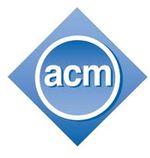Difference between revisions of "Association for Computing Machinery"
| Line 31: | Line 31: | ||
Also in 1966, the Associations Code of Ethics and Guidelines for Professional Conduct in Information Processing was first implemented, expanded in 1972 and it was again revised in 1992 and is the current Code of Ethics and Professional Conduct of ACM. In 1994, ACM and the Institute of Electrical and Electronics Engineers ([[IEEE]]) collaborated to create the code of ethics and professional practices for Software Engineers which was finalized in 1999.<ref> | Also in 1966, the Associations Code of Ethics and Guidelines for Professional Conduct in Information Processing was first implemented, expanded in 1972 and it was again revised in 1992 and is the current Code of Ethics and Professional Conduct of ACM. In 1994, ACM and the Institute of Electrical and Electronics Engineers ([[IEEE]]) collaborated to create the code of ethics and professional practices for Software Engineers which was finalized in 1999.<ref> | ||
[http://www.bookrags.com/research/association-for-computing-machinery-este-0001_0001_0/ www.bookrags.com]</ref> | [http://www.bookrags.com/research/association-for-computing-machinery-este-0001_0001_0/ www.bookrags.com]</ref> | ||
| + | |||
Since its establishment, one of the primary concerns of ACM is the ethical issues in computing and information technology. The association is dedicated in promoting responsible practices among professionals in the computing industry. | Since its establishment, one of the primary concerns of ACM is the ethical issues in computing and information technology. The association is dedicated in promoting responsible practices among professionals in the computing industry. | ||
==References== | ==References== | ||
{{reflist}} | {{reflist}} | ||
Revision as of 18:19, 29 June 2011
| Type: | Association |
| Industry: | Computing |
| Founded: | 1947 |
| Headquarters: | New York |
| Country: | USA |
| Website: | www.acm.org |
| Key People | |
| Alain Chesnais, President Barbara G. Ryder, Vice President Alexander L. Wolf, Secretary/Treasurer John R. White, Executive Director & CEO | |
ACM (Association for Computing Machinery) is an academic society dedicated in the advancement of computing profession. It has a large membership of over 96,000 worldwide. The association serves its members and other professionals in computer sciences and its applications by providing high quality publications, conducting conferences, career resources and through its digital library.[1]
History
ACM was founded by in 1947 as Eastern Association for Computing Machinery during a meeting at Columbia University in New York. It was established due to the growing interest in computers during that time. A series of meetings and symposiums were held in different Universities regarding electronic computing machinery. In 1948, it was officially called Association of Computing Machinery and its constitution was instituted via membership approval in 1949.
In 1966, ACM created the AM Turing Award in recognition to the the great contributions of British Mathematician Alan M. Turing in the computing profession. The AM Turing Award is awarded annually to individuals who presents that the technical nature of their work has a great impact in the lifetime development of computer science. This award is regarded as the Nobel Prize for Computer Science.[2]
Also in 1966, the Associations Code of Ethics and Guidelines for Professional Conduct in Information Processing was first implemented, expanded in 1972 and it was again revised in 1992 and is the current Code of Ethics and Professional Conduct of ACM. In 1994, ACM and the Institute of Electrical and Electronics Engineers (IEEE) collaborated to create the code of ethics and professional practices for Software Engineers which was finalized in 1999.[3]
Since its establishment, one of the primary concerns of ACM is the ethical issues in computing and information technology. The association is dedicated in promoting responsible practices among professionals in the computing industry.
